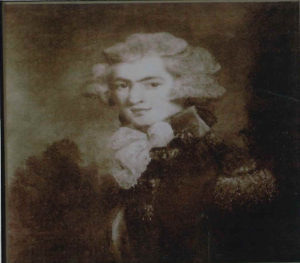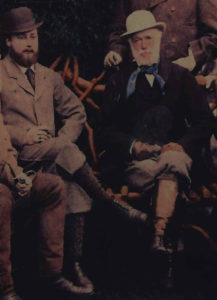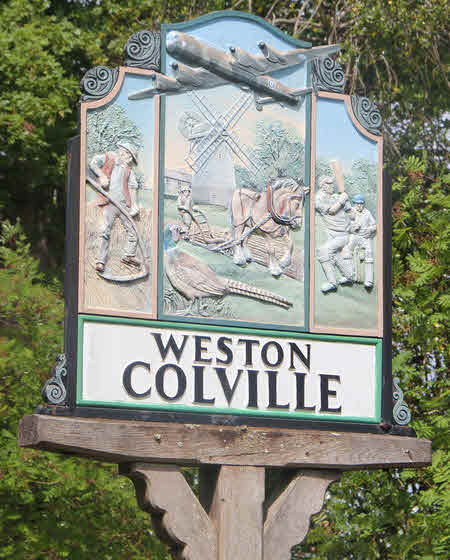The military played a large part in the lives of the Hall family and the first, Thomas Hall, was Lieut. Col. and later General. He bought the Weston Colville estate, probably in the late 1780s from his brother-in-law, using £5,000 of his marriage settlement as part payment, but lived instead at West Wratting Park, the Hall reverting to a farmhouse. When he died in 1810, he left the estate to his only son John Hall who was then squire until his death in 1860. He had the high standing of his father, representing Cambridgeshire as Deputy-Lieutenant an d in 1819 serving as High Sherriff of Cambridgeshire and Huntingdonshire. Unlike Thomas, though, he was very much part of village life, living at Weston Colville Hall, being Lord of the Manor, held the advowson (the right to appoint the clergyman) and employed most of the village. He was a generous squire, in 1831 reducing his rents by 30% and being written up in the 1858 Cambridge Chronicle: ‘with his customary liberality Mr Hall has ordered coals to the value of £40 to be distributed in the parishes of Great and Little Wilbraham, Bottisham, Westley (Waterless), Carlton and Weston Colville’.
d in 1819 serving as High Sherriff of Cambridgeshire and Huntingdonshire. Unlike Thomas, though, he was very much part of village life, living at Weston Colville Hall, being Lord of the Manor, held the advowson (the right to appoint the clergyman) and employed most of the village. He was a generous squire, in 1831 reducing his rents by 30% and being written up in the 1858 Cambridge Chronicle: ‘with his customary liberality Mr Hall has ordered coals to the value of £40 to be distributed in the parishes of Great and Little Wilbraham, Bottisham, Westley (Waterless), Carlton and Weston Colville’.
His country life extended to keeping a regular hawking establishment and he was one of the few landowners in England to do so. J.R. Withers, the poet born in Weston Colville at the time John Hall became squire, records seeing Squire Hall with one of his falcons in his poem My Native Village. Siltzer’s Newmarket Sport and Personalities says that ‘Mr Hall used to hawk every week and went far towards restoring the old conditions and style, sallying forth in full panoply of hawking pageantry preceded by his head falconer and other attendants garbed in correct old falconer’s attire, bearing a cast of six long winged hawks for flights at partridges’. On his death, at his own request there was no hearse or coach and he was carried to the church by 10 village men, presumably his tenants. His obituary in the Gentleman’s Magazine recalled that ‘for a long period of time he ministered in every way to the benefit of those around him, particularly the poor on his estates’.
He was succeeded by his son, of the same name and similar nature, General John Hall, pictured right here. He regularly hosted sho oting parties on the Six Mile Bottom Estate, famous nationwide for the quality of its partridge shoot. He invited members of the royal family including Edward, Prince of Wales (left). One occasion was followed by ‘sumptuous luncheon, by invitation of the tenant farmer, Mr W.H. Palmer, at Weston Colville Hall.’ This quote is from a detailed and well-researched account The Squires of Weston Colville, Cambs. From 1700-1912 by Timothy Cockerill that is worth a read for more on this fascinating family and beyond. Two last details before we leave the Halls. The first is from this same history and appeared in the Cambridge Chronicle describing his funeral in 1872: ‘The cortege arrived at the Old Hall in Weston Colville about noon where the tenantry and servants were awaiting them. The occupants of the carriages having alighted the whole formed into procession and walked to the church… The church and churchyard were densely thronged with mournful villagers’. The second is the link to William Henry Hall becoming squire: the estate came to him via his uncle Major Charles Hall, General Hall’s brother whose face we can see in stained glass in St Mary’s.
oting parties on the Six Mile Bottom Estate, famous nationwide for the quality of its partridge shoot. He invited members of the royal family including Edward, Prince of Wales (left). One occasion was followed by ‘sumptuous luncheon, by invitation of the tenant farmer, Mr W.H. Palmer, at Weston Colville Hall.’ This quote is from a detailed and well-researched account The Squires of Weston Colville, Cambs. From 1700-1912 by Timothy Cockerill that is worth a read for more on this fascinating family and beyond. Two last details before we leave the Halls. The first is from this same history and appeared in the Cambridge Chronicle describing his funeral in 1872: ‘The cortege arrived at the Old Hall in Weston Colville about noon where the tenantry and servants were awaiting them. The occupants of the carriages having alighted the whole formed into procession and walked to the church… The church and churchyard were densely thronged with mournful villagers’. The second is the link to William Henry Hall becoming squire: the estate came to him via his uncle Major Charles Hall, General Hall’s brother whose face we can see in stained glass in St Mary’s.
